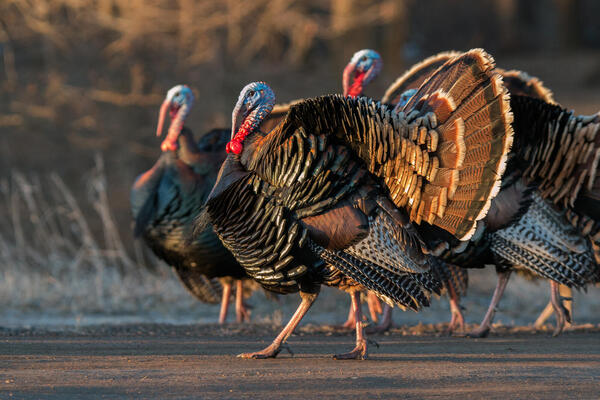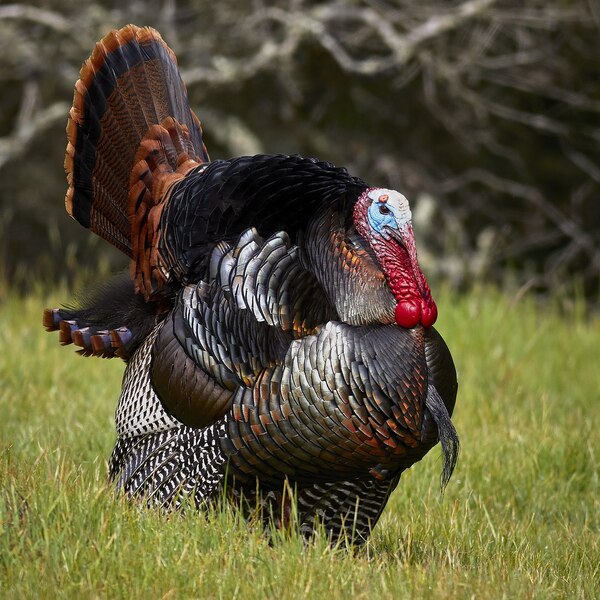The Turkey (bird) is way more fascinating than most people realize. Sure, it’s the star of Thanksgiving feasts, but there’s a lot going on with turkeys behind the scenes. From their quirky behaviors to their cultural significance and even the challenges they face, this bird deserves more credit than it usually gets. So, let’s dive in deeper and get to know the Turkey (bird) on a whole new level.

First off, let’s talk about how cool these birds look. Wild turkeys are nothing like their farm-raised cousins. They’re sleek, with glossy, iridescent feathers that shimmer in shades of bronze, green, and even purple under the sun. If you’ve ever seen a wild Turkey (bird) puff up its chest and fan its tail during a mating display, you know it’s a showstopper. It’s like the bird is saying, “Look at me, I’m fabulous!”
Farm turkeys, on the other hand, are bred for size. These guys can weigh up to 40 pounds, making them the heavyweight champs of the bird world. But don’t let their size fool you—turkeys have personality. They’re curious, social, and even playful. Some people who keep turkeys as pets swear they’re as fun to watch as dogs or cats!
When it comes to raising turkeys, their life cycle is pretty straightforward:
Egg stage: The female turkey lays a clutch of 10-12 eggs, and they incubate for about 28 days.
Poults (baby turkeys): Once hatched, poults are fluffy and fragile, needing warmth and protection.
Juvenile stage: By the time they’re a few weeks old, poults can run around, forage, and roost in trees.
Adulthood: Turkeys mature quickly, reaching full size within 4-6 months.
For farmers, understanding this cycle is key to managing turkey flocks efficiently. Each stage has its own challenges, from keeping poults safe from predators to providing the right feed for adult turkeys.
Turkeys aren’t picky eaters, but they do like variety. In the wild, a Turkey (bird) will spend its day scratching at the ground, looking for a mix of:
Seeds and grains: Corn, wheat, and other crops are favorites.
Berries and nuts: These add a bit of sweetness to their diet.
Insects and small critters: Grasshoppers, beetles, and even small frogs are fair game.
Domesticated turkeys get a more controlled diet, often including fortified grains and protein-rich pellets to ensure they grow strong and healthy. And yes, turkeys drink a lot of water, so keeping them hydrated is crucial, especially in hot weather.

Turkeys are super adaptable. Wild turkeys can be found all over North America, from dense forests to open grasslands. They’re excellent foragers and are surprisingly good at flying—short distances, that is. You’ve probably heard the joke that turkeys can’t fly, but wild turkeys can take off at speeds of up to 55 mph! They also roost in trees at night to stay safe from predators.
Farm-raised turkeys, on the other hand, are bred for size, which makes flying pretty much impossible. They live in controlled environments with access to food, water, and shelter. However, raising them sustainably requires careful planning, from ensuring enough space to managing waste.
You can’t talk about the Turkey (bird) without mentioning Thanksgiving. This bird is the star of the holiday, but did you know it almost became the United States' national bird? Benjamin Franklin was a big fan of turkeys and thought they were more respectable than bald eagles. While that didn’t happen, turkeys still hold a special place in American culture.
Beyond Thanksgiving, turkeys appear in Native American stories and ceremonies. They symbolize abundance, gratitude, and connection to nature. In modern times, turkeys are also a symbol of farming innovation and sustainable practices.
Who doesn’t love a well-cooked turkey? From roasted turkey with gravy to turkey sandwiches and even turkey bacon, this bird is versatile and delicious. Here are some highlights of turkey’s role in global cuisine:
Thanksgiving roast: The ultimate holiday centerpiece.
Turkey soup: Perfect for using leftovers.
Smoked turkey: A smoky twist that’s packed with flavor.
Ground turkey: A lean alternative to beef in burgers and meatballs.
Not to mention, turkey is low in fat and high in protein, making it a healthy choice for everyday meals.
Turkeys face their share of challenges, both in the wild and on farms.
Habitat loss: Urbanization and deforestation reduce the spaces where wild turkeys can thrive.
Predators: Foxes, coyotes, and hawks are natural threats to wild turkeys.
Disease: Farm-raised turkeys are vulnerable to illnesses like avian flu and blackhead disease.
Farmers and conservationists are working hard to tackle these issues, using everything from advanced breeding techniques to habitat restoration projects.
Conservation efforts have helped wild turkey populations rebound significantly. In the early 1900s, wild turkeys were nearly wiped out due to overhunting and habitat loss. Today, thanks to reintroduction programs and stricter hunting regulations, their numbers are thriving in many areas.
Scientific research continues to focus on making turkey farming more sustainable. From reducing the environmental impact of large-scale turkey farms to finding natural ways to prevent diseases, there’s a lot happening in this space.
Whether you’re looking at the Turkey (bird) as a wild creature, a farm animal, or a holiday staple, it’s clear this bird is pretty incredible. From its striking appearance and unique behaviors to its cultural and culinary importance, the turkey has earned its place in our lives. So next time you see a turkey—whether it’s running through the woods or sitting on your plate—take a moment to appreciate all the fascinating things about this remarkable bird.
animal tags: turkey-bird
We created this article in conjunction with AI technology, then made sure it was fact-checked and edited by a Animals Top editor.